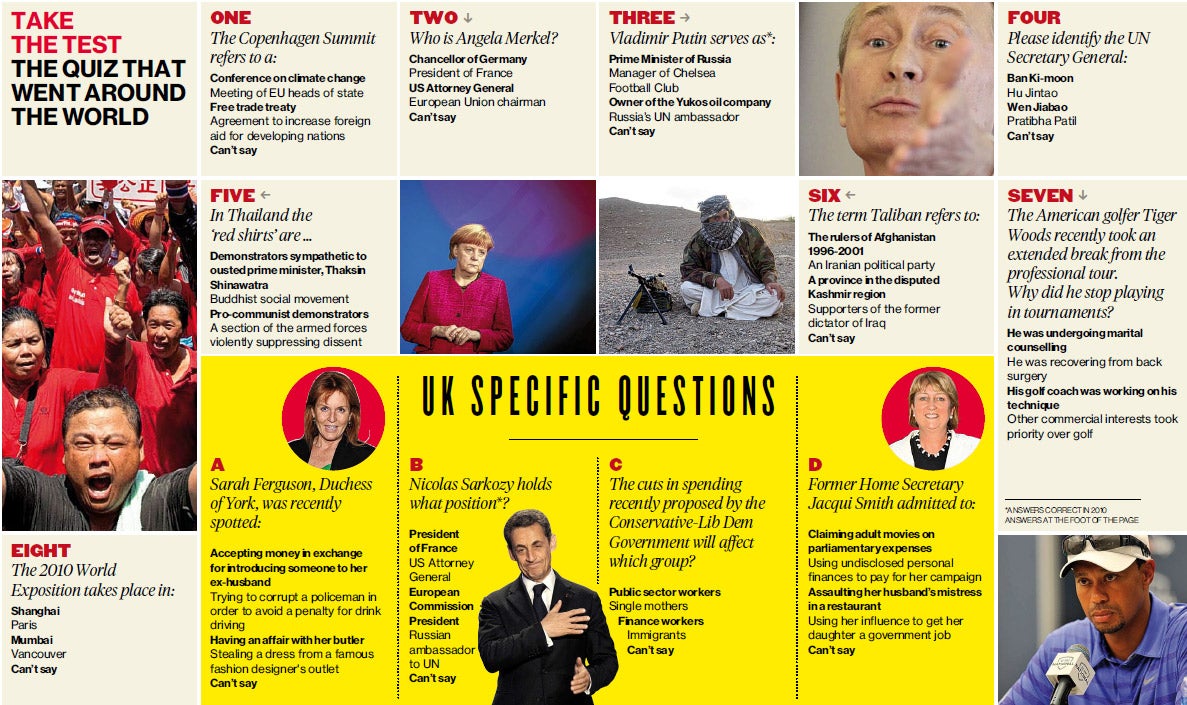This is a man’s world: Shock quiz results show how women are left disengaged by politics
Men score more highly in political quiz in 10 nations because, say campaigners, they dominate the debate

Women know less about politics than men, according to a controversial study out tomorrow.
Click image to enlarge graphic and take the test (answers below)
A group of researchers from universities in 10 countries said they were shocked to discover an “unmistakable” gender gap in what men and women knew about current affairs. Sociologists said that the results reflected how marginalised women still feel from public life, where the majority of leading figures are men.
“The fact that throughout the whole world women know less about politics than men and that this is as true for people in Norway as it is in Colombia is really very surprising,” said James Curran, a media professor at Goldsmiths, University of London, one of the project’s 15 researchers.
A century on from the summer when suffragette Emily Davison died for the right to vote, the research suggests many women in Britain are fundamentally disengaged from politics. While men scored an average of 58 per cent in a current affairs quiz, women got an average of 39 per cent.
The trend was not confined to Britain either. In all 10 nations surveyed, women got significantly lower scores than their male counterparts when asked about the news.
The global research project, which was funded by the Economic and Social Research Council, tested knowledge of domestic and international news in Australia, Canada, Colombia, Greece, Italy, Japan, Korea, Norway, the UK and the US. It found that the gender gap persisted regardless of the country’s wealth or policies.
Many women’s lack of interest in news also reflects how little they are portrayed in the media, the study found. News coverage continues to be heavily weighted toward male sources even in countries such as the UK and Australia where gender equality ratings are relatively high.
Overall, women were only interviewed or cited in 30 per cent of TV news stories in the nations surveyed. They are also more likely to be quoted in features or “soft” news stories, such as family, lifestyle and culture.
The University of Tokyo’s Professor Kaori Hayashi, one of five female academics involved in the project, said: “Such under-representation and topical bias of women in news media may curb women’s motivation to acquire political knowledge actively, and discourage them from political participation, and even prevent women from engaging as citizens in a democratic society.”
Experts believe the fact that women are still substantially under-represented in politics and other senior public positions also makes them less likely to follow the news. Fewer than 23 per cent of all MPs are women and only one of 11 Supreme Court Justices is a woman.
Caroline Criado-Perez, founder of the Women’s Room, a group trying to redress gender imbalance in the media, said: “I’m not surprised [by the findings] because there’s a lot of research into the fact that women need to see themselves represented in order to feel part of the debate. Girls aren’t born not interested in politics – any more than boys are born engaged with it. Boys are shaped to be interested in it and feel they have a stake in it and people are listening to them.”
A 2001 US study showed that in states with no female Senator (or Senate candidate), 65 per cent of men and 51 per cent of women could name one Senator. However, in states with a female Senator or female candidate, 75 per cent of men and 79 per cent of women could name a Senator.
Having less leisure time was also found to be a factor – with older people of both sexes more engaged with the news. Older men in advanced industrial nations were the most likely to be knowledgeable about it. Professor Curran said: “One issue is women may have less time. Women who are mothers with children are very busy and often go out to work as well as doing more in the home, which often means they have less time than men [to take in news].”
The study also discovered that gender gaps in political knowledge tend to be even wider in more advanced economies than in less advanced economies such as Colombia.
This gap also seems to be unaffected by a country’s equality policies. For example, the gulf between men and women’s knowledge of politics is greater in Norway – a country ranked highly in terms of gender equality – than in South Korea, a country with a much lower equality rating.
Ceri Goddard, chief executive of the Fawcett Society, said: “These findings should send a signal to our political leaders that more needs to be done to engage women fully in the political process.”
Answers 1: Prime Minister of Russia. 2: Chancellor of Germany. 3: Conference of climate change. 4: Ban Ki-moon. 5: Thaksin Shinawatra supporters. 6: rulers of Afghanistan, 1996-2001. 7: Marital counselling. 8: Shanghai. UK questions: A: Public sector workers. B: President of France. C: Accepting money for introducing someone to her ex-husband. D: Claiming adult movies on expenses
Join our commenting forum
Join thought-provoking conversations, follow other Independent readers and see their replies
Comments